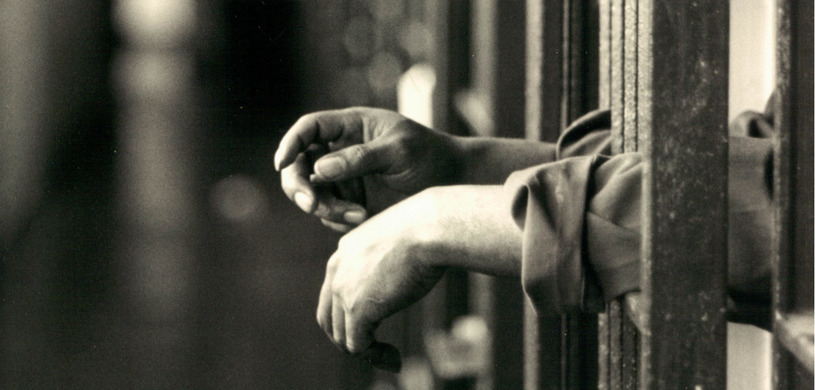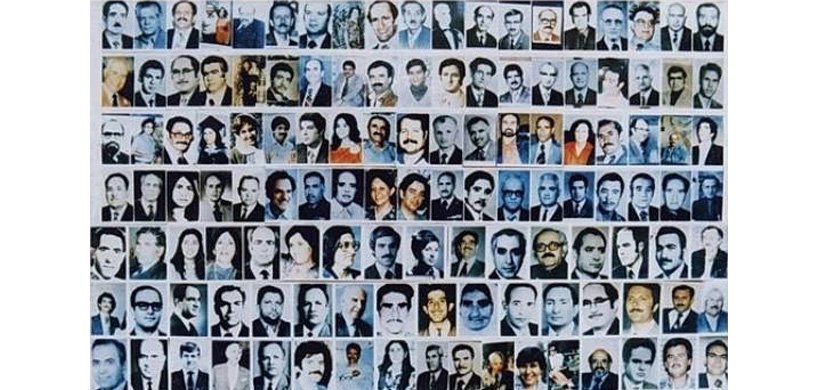Source: en.iranwire.com
Monday 01 February 2016 Fereshteh Nasehi

When I speak with Baha’i prisoners, the single phrase I hear most often is “My father was executed in the 1980s.”
Rajai Shahr Prison near Tehran houses more Baha’i inmates than any other prison in Iran. There are around 40 Baha’is at the facility, including prominent leaders, all of whom have been sentenced to 20 years in prison, as well as university professors. Bahai’s from faraway cities including Shiraz and Gonbad Kavous have been transferred to Rajaei Shahr to serve their sentences. Initially, they were sent to Evin Prison, but after a few months, they were moved to Ward 12 at Rajai Shahr, known for housing political prisoners and prisoners of conscience.
Saeed is an inmate of Ward 12 at the prison. He spoke to IranWire about his fellow Baha’i inmates. “I have good Baha’i friends here although I am a Muslim and grew up in a traditional Muslim family,” he said. “My Baha’i friends and I mostly meet in the kitchen. Both my friends are cooks for the Baha’i cell block. The quality of prison food is really not any good. They are friendly and when I ask them questions about their religion they answer openly. Most of them come from northern cities like Gorgan and Sari; that is why inmates from the north run the Baha’i ward. They do a really good job of providing services and provisions.”
But Saeed said that some political prisoners are frustrated with Baha’i prisoners. “Their complaint is that Baha’i inmates do not stand up against the prison’s management. Baha’i inmates do not participate in protest actions, such as going on hunger strikes — actions other prisoners of conscience take to protest against the violations of their rights. But the Baha’is believe they must avoid confrontations with the government. ‘We are not political. We only want to safeguard our faith,’ they say.”
“Mr. S” is a 55-year-old Baha’i inmate serving a 10-year sentence at Ward 12. “The conditions in prison are now much better than what they were in the 1980s,” he said. “In those days the prison guards refused to touch us because they considered us to be untouchables. They told us to keep our clothes and belongings separate from those of other prisoners. We were not allowed to wash our clothes with other prisoners’ clothes, and we could not hang them on the same rack. The atmosphere in those days was extremely hostile to us. They treated us like sub-humans. But nowadays Muslim prisoners and others do not treat us this way.” At the same time, Mr S says that nothing has changed at the higher levels of prison management. “Interrogators treat Baha’i prisoners the same as they did before.”

The Untouchables
“Mr. Z”, another Baha’i inmate, told IranWire about the humiliation he faced after he was arrested. The day he was arrested and blindfolded, the arresting Intelligence Ministry agent would not guide him to the prison and to his cell. Instead, the agent used a stick to prevent any physical contact with him.
Amin, another prisoner of conscience, described the Baha’i inmates he has known during his long years in prison as “really dignified and respectable.” He acknowledged the government’s blatant discrimination of Baha’is. “Most are educated, own businesses and workshops and are well-off. But the government prevents them from getting ahead in business and denies them government jobs. They behave well and we live together like ordinary citizens regardless of our ideological and religious differences.”
“They regularly participate in the daily chores of the wards. They are never insulting. If it is necessary to divide chores, they accept responsibility, and always do a good job. The Bahai’s’ only demand is that they be treated like other citizens. A human being has rights by the mere fact that he is a human being. But unfortunately the government does not recognize these rights when it comes to our Baha’i friends.”
Baha’i inmates include officials from the Baha’i Institute for Higher Education (BIHE or Baha’i Open University), an underground and mostly virtual university. It was set up to compensate for the ban on Baha’is pursuing higher education. Charges against them include “propaganda against the regime,” “gathering information and conspiracy against national security” and “proselytizing the Baha’i faith”. Mr. Z is one these prisoners. “The morale of imprisoned Baha’is is high, even though we enjoy fewer amenities than others, we are often subjected to discrimination and we are not permitted furloughs [time out of prison to spend with family or deal with health issues]. Nevertheless, we don’t complain. We serve our sentences patiently.”
Impressing an Al Qaeda Sympathizer
Hasan was given a prison sentence because he had been found guilty of supporting terrorist group Al Qaeda. He said he has been surprised by his Baha’i fellow inmates. “We were in the prison’s chapel and, with a prison official present, a calm discussion started between me, a Sunni, a devout Shia, and this leader of the Baha’i community,” he said. “We talked about the Koran and the Muslim belief that Mohammad was the last prophet sent by God. Where the discussion started and ended is not important — but the conduct of that Baha’i gentleman changed my views towards the other Baha’is in the prison. We talked about shared beliefs, and where we differed. When we got to the differences, both the extreme Shia inmate and I became agitated and started shouting. When we asked the Baha’i gentleman whether he believed in Koran or not he said. ‘yes, we respect the Koran as a divine book.’ He argued calmly and serenely that our differences are the work of a common enemy and there is no reason why we cannot live together freely and compassionately just because our beliefs are different.”
Saeed spoke about the Baha’i prisoners’ religious rites while in prison.“They treat each other with calmness and good will and recite their prayers in a pleasant manner. They smuggle in leaflets with scriptures from their holy books. They observe their 19-day period of fasting meticulously, reciting scriptures.”
“Getting religious texts is an ordeal for them because prison officials say it is not a recognized religion,” said Saeed. “So they see no reason to let Baha’is have their sacred texts. But I have to say that in recent years prison officials have been treating them better — even though the number of Baha’i detainees increases by the day. But perhaps the calm that the Baha’is show, their patience, their silence when mistreated and of course their avoidance of political activities has led prison officials to recognize their human essence more. Surprisingly, once in a while you can see a prison guard or a ward officer exchanging warm pleasantries with a Baha’i inmate.”
February 3, 2016 2:07 pm
Holy QUR-AN
Surat 7 A.34-35-36-37
February 3, 2016 8:12 pm
I am 7th. generation Canadian and have been a Baha’i for over 50 years …and it was Baha’u’llah who taught me to love Islam and the Qu’ran. I was the first Bahai in our family.
My husband , children and grandchildren have all chosen this Path
for It holds the Promise of World Unity and World Peace. ” For universality is of God and all limitations, earthly.”
February 4, 2016 4:02 pm
Love humanity for the sake of God. Religion is one and shouldn’t be a source of differences but it should bring peace and unity. As Bahais we are taught to love everyone regardless of racial, class or religious background. May God protect and bless all our Bahai Irarian friends serving imprisonment and their colliques
February 24, 2016 7:39 pm
The Baha’i International Community UN office in New York should start a campaign to nominate the YARAN and the Baha’i Youth of Iran for the Nobel Peace Prize.